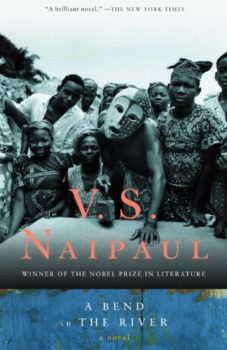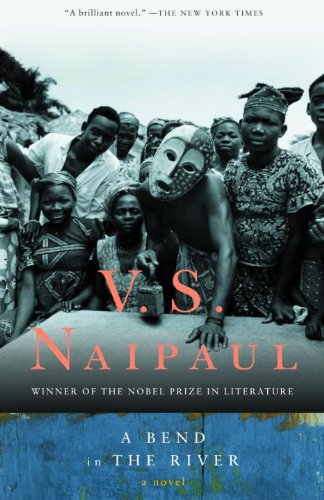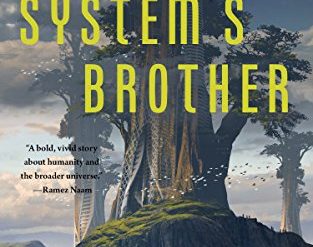
In 1960, the chief of staff of the army in the recently independent Belgian Congo led a coup that toppled the democratically elected government of Patrice Lumumba. Five years later he ousted the men he had installed in power and became the country’s dictator. His name was Mobutu Sese Seko. He remained in power until 1997, diverting somewhere between $4 billion and $15 billion in government funds into offshore accounts. His regime was notorious for corruption and human rights abuses. And that unflattering picture of Africa provides the backdrop to Nobel Prizewinner V. S. Naipaul’s celebrated story of the continent in the wake of colonization, A Bend in the River.
Estimated reading time: 4 minutes
Where the story is set
A Bend in the River is set in the 1960s in the Congo, although the country is never identified by name. (It’s now the Democratic Republic of the Congo, or DRC.) The town where most of the action takes place might be the city of Kisangani (formerly Stanleyville), today an urban center of some 1.6 million people; however, in the sixties, the town’s population was less than 200,000. (Kisangani was the site of one of the country’s first airports, is located about a two-hour flight from Kinshasa, the capital, and a university was founded there in 1963, all as described in the novel.)
A Bend in the River by V. S. Naipaul (1979) 290 pages ★★★★☆
A young man buys a retail business “at the bend of the great river”
The protagonist of the novel is a young man named Salim, a nominally Muslim member of a trading family on “the coast” of East Africa (probably Mombasa, Kenya). His family had emigrated to Africa centuries earlier. But “[w]e were distinct from the Arabs and other Muslims of the coast; in our customs and attitudes we were closer to the Hindus of northwestern India, from which we had originally come.” But for Salim, who is expected to marry the daughter of a family friend, life on the coast is not appealing. So, when the friend, Nazruddin, offers to sell him cheaply a business he had run in the interior at “the bend of the river,” he jumps at the chance. And that decision sets him down into the “chaos and corruption” of the Congo.
A love affair against the backdrop of “the chaos and corruption of the place”
As an expatriate, Salim is a foreigner to the local people and gravitates toward other expatriates. And when a polytechnic university is built just outside town, he becomes involved with a European man on the faculty there. The man is known as the “Big Man’s” teacher—President Mobutu, in other words. Salim is worshipful of the man and drawn to his much younger wife, Yvette, who draws him into a protracted affair. Through the ups and downs of the local economy, through Yvette’s husband’s on-again-and-off-again relationship with the President, through a murderous rebellion and, later, an overreaction from the Big Man, Salim and Yvette satisfy their hunger for each other. Until the crisis reaches a peak, and it becomes clear that Salim will lose everything unless he leaves for good.
Naipaul’s unflattering picture of Africa
In big ways and small, the author makes clear his low opinion of the people of the Congo. Certainly, the corrupt and brutal government and the unschooled ignorance of the villagers who flock into the cities provide rich sources of criticism. But only rarely does Naipaul show an African character in a sympathetic light. In fact, not a single character in A Bend in the River appears to be happy. (There are exceptions, but Naipaul implies they’re simply acting happy for effect.) He paints a sad picture of a country that, unfortunately, hasn’t come very far in the half-century since the novel’s conclusion in the late sixties. This is, indeed, an unflattering picture of Africa. Africa deserved better.
About the author
V. S. Naipaul (1932-2018) won the Nobel Prize for Literature in 2001. A Bend for the River is widely cited as one of his most outstanding works, along with A House for Mr. Biswas, In a Free State, and The Enigma of Arrival. Naipaul was born in Trinidad, where his grandparents had migrated to work as indentured laborers on the sugar plantations. He was educated at the University of Oxford.
For related reading
For a masterful study of the colonial era in the Belgian Congo, see Adam Hochschild’s King Leopold’s Ghost. (I haven’t reviewed the book because I read it long before I began writing this blog in 2010.)
You might also be interested in:
- 20 top books about Africa
- 20 most enlightening historical novels
- Third World poverty and economic development: a reading list
- 20 top nonfiction books about history
You might also check out Top 10 great popular novels
And you can always find my most popular reviews, and the most recent ones, on the Home Page.



























